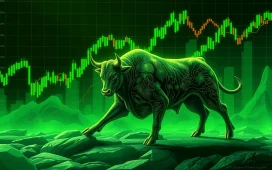Zac Townsend, CEO and co-founder of Meanwhile, has expressed concerns about Kamala Harris’s proposed 25% unrealized capital gains tax. Townsend, a vocal critic of the plan, warns that the tax could lead to a significant sell-off in crypto markets and harm investors across the board.
Kamala Harris’s 25% Unrealized Gains Tax Proposal
Last month, Vice President Kamala Harris endorsed a bold new fiscal policy that could transform how unrealized capital gains are taxed in the United States. This proposal is part of a broader economic strategy under the current administration. It suggests a 25% tax rate on the appreciated value of unsold assets, including cryptocurrencies.
Critics argue that this move deviates sharply from traditional tax norms, which have typically taxed profits only upon the realization of gains through sales.
The tax specifically targets the assets of Americans whose net worth exceeds $100 million. While it aims to address inequalities within the current tax system, the policy has stirred unrest among investors.
According to Townsend, the implementation of such a tax will compel large-scale asset holders to liquidate portions of their portfolios. This could flood the market with digital currencies, potentially driving down prices and diminishing the value of investments.
For instance, high-profile Bitcoin investors such as the Winklevoss twins, who bought their BTC at just $10, could face a crypto tax bill reaching $1 billion under the new policy. Similarly, Tim Draper, an early investor in Bitcoin with purchases at around $632 per coin, could be hit with a $423 million crypto tax demand. This illustrate the impact of such a tax as these large sell-offs could depress cryptocurrency prices universally.
Additionally, Townsend’s critique extends beyond the immediate financial burdens on wealthy investors. He argues that the tax would alter fundamental investment strategies within the cryptocurrency space. Typically, cryptos are favored for long-term holding due to their potential for high returns over time.
However, with the looming threat of a crypto tax on unrealized gains, the incentive for “holding on” diminishes. This would lead to increased market volatility and a departure from long-term investment strategies.
Political Developments and Market Speculation
In political arenas, Kamala Harris’s tax proposal coincides with fluctuating perceptions of her leadership as she is currently tied in the polls with Donald Trump. The political uncertainty adds another layer of concern for investors as regulatory changes will impact their holdings.
Moreover, Kamala Harris has been urged to host a crypto policy roundtable in October. This event could provide a platform for discussions on the future regulatory landscape for cryptos. Crypto leaders and stakeholders hope that this dialogue will lead to more balanced and inclusive policies.
As the 2024 US elections approach, the crypto industry continues to be a major battleground for both Kamala and Trump. However ,the crypto community has shown more support for the Republican Party candidate. Most recently, analyst Eric Balchunas said that Donald Trump’s victory could influence the fate of XRP and Solana ETFs.
Disclaimer: The presented content may include the personal opinion of the author and is subject to market condition. Do your market research before investing in cryptocurrencies. The author or the publication does not hold any responsibility for your personal financial loss.












✓ Share: